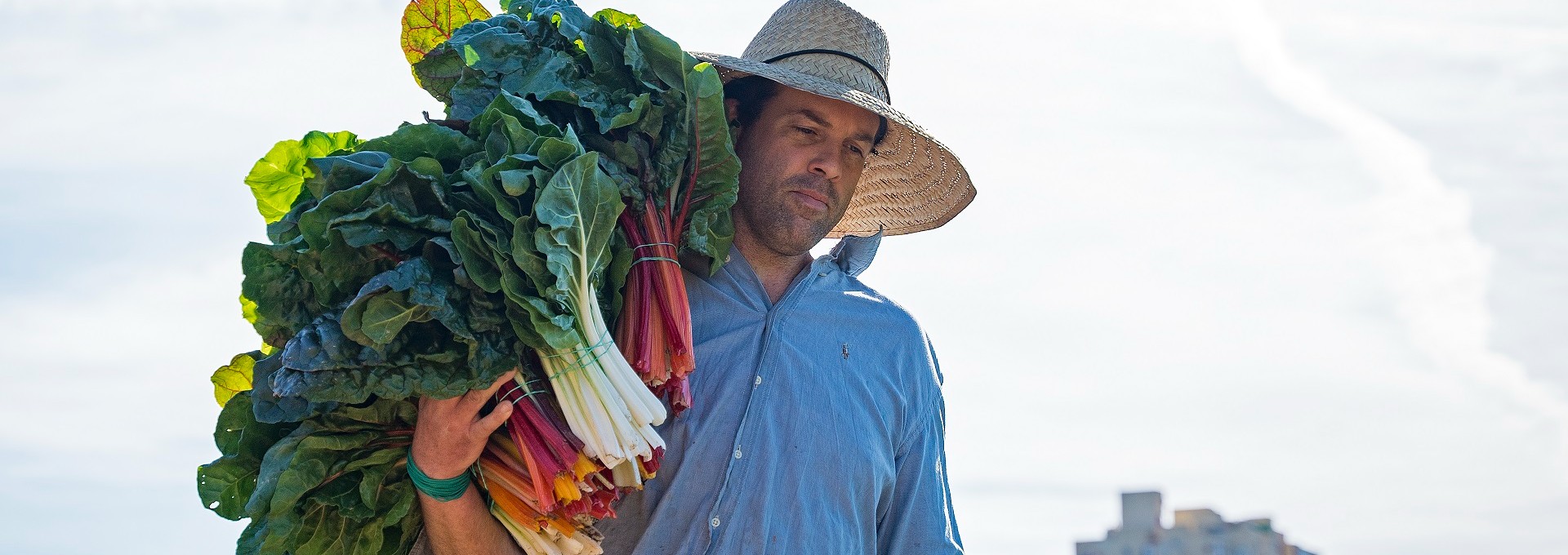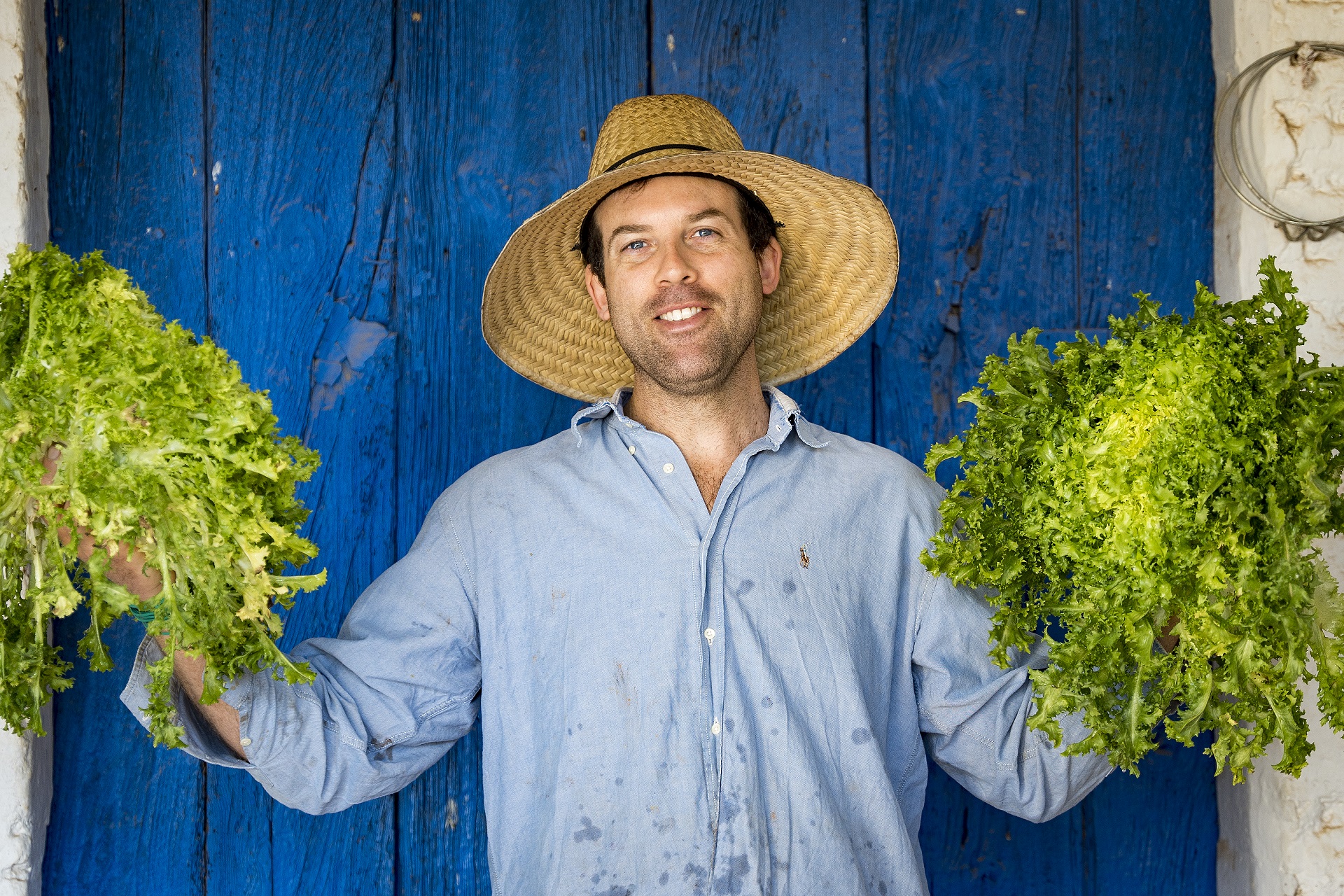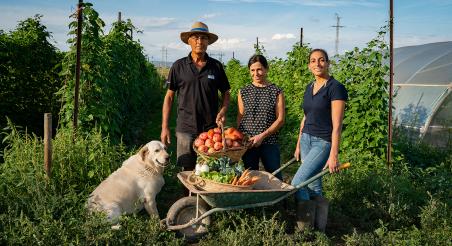Ricard Huguet (Vilanova i la Geltrú, 1988) signed up for a degree in Catalan philology but dropped out after two months because he felt he was being treated «like a customer» and because, in actual fact, what he’d always wanted to do was embark on a career in farming, a profession that really grabbed his interest. He was keen to follow in his maternal grandfather’s footsteps. To achieve this goal, he trained at the Agricultural School of Manresa. Afterwards, he gained some work experience at the Mas Martinet winery, in the village of Gratallops (Priorat). But the key moment on his learning path was the period when he worked with Vicent Martí, an organic farmer from L’Horta de València (an agricultural area in the Valencia region) with more than 40 years’ experience in agroecology.
By 2011, Ricard felt he had acquired enough knowledge and experience to embark on his own project, L'Horta de les Casetes, for which he managed to obtain the certification of the Catalan Council for Organic Agricultural Production. Over the course of his career, he’s used animal traction as a method to work the land, and has become a leading figure in the organic vegetable farming sector in the county of Garraf. He sells his products direct to customers and has a stall at the Saturday market in Sitges. Ricard enjoys the recognition of his customers, but he’s somewhat pessimistic about the current state of agriculture in Catalonia. What’s more, he’s going through difficulties in his relationship with the owners of Les Casetes and access to water is a major concern for him. Nonetheless, he’s confident of finding solutions and overcoming obstacles in order to continue his passion for cultivating the land.
Could you describe L’Horta de las Casetes and explain how it’s evolved since its beginnings?
L’Horta de les Casetes is wonderful, a real paradise. It feels good to be in this extremely well-located, beautiful place. It’s a pleasure to work here, a place where I can get away from it all. I’d like to make it clear that farming itself isn’t the problem; on the contrary, it’s a lovely profession, but we shouldn’t romanticise it! We shouldn’t imagine that we’re Manelic in Terra Baixa, who’s from the highlands. Nowadays we don’t wear a barretina and espadrilles. Things are different now, but it’s still a lovely job. I love it. This spot is beautiful, and crop thefts aren’t an issue here. There’s also plenty of fauna and biodiversity.
Over the last 12 years, I’ve managed to establish a great balance on this land. I can afford to let biodiversity work at its own pace and I don’t have any major problems with my crops or with pests. Things are pretty good here, to be honest.
«L'Horta de les Casetes is a real paradise» Ricard Huguet
What were your initial dreams for L'Horta de les Casetes and what’s it like now?
I originally planned the vegetable garden to be a more labour-intensive project, something more elaborate, like a garden, a more beautiful space with a greater variety of plants and more biodiversity. But it’s not feasible, because I’d have to charge twice as much for the vegetables, which is impossible.
The vegetable garden I have today is adapted to the prevailing socio-economic cycles, whereas the one I wanted to create was framed in another context. I’ve had to do things this way because very little value is attached to food and farming nowadays, so there are many processes that can’t be implemented; they’re unfeasible in economic or practical terms. This means that I have to work with the minimum amount of resources as best I can. I can’t set the bar too high.
«Very little value is attached to food and farming nowadays» Ricard Huguet
What exactly would you need in order to make your original project a reality?
It’s not a matter of money, but rather one of will. In my particular case, it’s a matter of political will. I have a very specific problem in a specific place, which is the irrigation water distribution network of the Foix reservoir. Everyone passes the buck and it affects many farms, including mine, that were irrigated for 30 years but can no longer be irrigated.
What are the main lessons you’ve learned in the 12 years you’ve been working at Les Casetes, getting your hands dirty in the earth and listening to it?
One of the things I've learned is that every plot of land is different, with its own specific circumstances and environment. I’ve also realised that the personal situation of one farmer can differ widely from that of another. Although it may seem obvious, it’s important to emphasise this: you can’t generalise. I arrived here from the L’Horta de València area and I’ve had to adapt many of the ideas I had because things are different here.
«Every plot of land is different, with its own specific circumstances and environment» Ricard Huguet
Society’s perception of the farming profession is better than it was 60 years ago. Have you felt that recognition for the work you do?
No, I don’t feel it. Today’s society sees farming as part of the decoration of a theme park, such as Port Aventura or Almería’s Far West. That’s because nobody’s starving in this country, for now... People may suffer hardships, but dying of starvation is highly unlikely. We’re suffering a terrible drought, but it doesn’t seem to affect the local economy... The importance of farming is underappreciated.
If the produce grown by farmers is not subject to the reciprocity regulations of the European Union (EU) but falls within the treaties of the World Trade Organization, we’ll continue to see produce imported from outside the EU that doesn’t comply with any of its treaties. Meanwhile, we’re obliged to comply with employment, phytosanitary and environmental regulations. The reality is that beans arrive in Catalonia from Sub-Saharan Africa that have been grown in an environment where producers’ rights aren’t respected. Then they’re sold here at rock-bottom prices and don’t comply with EU treaties. It’s a sorry state of affairs.
In the context of the current crisis of the agricultural sector in Catalonia, do you have any suggestions to improve the situation?
When we talk about farming of Catalonia, we’re not only referring to a Catalan problem; this is an issue for Europe and the Western world in general. It’s an inherent problem of capitalism and an economic model based on the accumulation of wealth, power and means of production in every sector. We farmers form part and parcel of this economic model like everyone else in our society. We have no wish to become martyrs! But fewer and fewer people are working in this sector. To improve farmers’ situation a little, laws should apply to everyone, so that all products entering the European Union meet the same requirements.
«To improve farmers’ situation a little, laws should apply to everyone, so that all products entering the European Union meet the same requirements» Ricard Huguet
Can you explain how L’Horta de les Casetes works? For example, what are the advantages of farming organically right from the start?
I don’t know about other farming methods, I’ve never practiced them. I opted for organic farming right from the get-go and I haven’t had any problems, just a few minor issues with snails and mildew. Generally speaking, everything’s fine, there aren’t any major complications. I don’t understand why so many products are used in fields... Perhaps it’s risky to adopt organic practices in other areas, but as far as vegetable gardens, vineyards and olive groves are concerned, I don’t understand the reluctance.
What does make things difficult is the crazy amount of red tape we have to wade through. On top of that, we’re told that a de-bureaucratisation committee will be set up for the primary sector while at the same time a compulsory digital field notebook has been introduced. You have to go online and update it every week. The difficulties of the digital divide and the existence of poor internet connections haven’t been taken into account.
We waste so many hours on red tape and it requires a lot of patience. There’s so much paperwork to do that we can’t handle it all ourselves, so we have to pay administrative agencies to do it. I think we should spend our time harvesting, irrigating and doing a few essential bits of paperwork, but not so many!
«I don’t understand why so many products are used in fields... Perhaps it’s risky to adopt organic practices in other areas, but as far as vegetable gardens, vineyards and olive groves are concerned, I don’t understand the reluctance» Ricard Huguet
You’ve started selling your products in a local market, haven’t you?
Until August last year, I sold everything direct here at the farmhouse. People came here to do their shopping. During the post-pandemic period, there was a decline in direct sales. In my case, they dropped by 60 or 70 percent. Most farmers experienced a decline in sales of 50 percent. In 2020, people would visit the farm shop and we were seen as the saviours of the world, but then, in the post-pandemic period, many small businesses folded.
I recently won a tender to have a stall at the Saturday market in Sitges, which has done my prospects of survival a lot of good. Nowadays, the Sitges market accounts for approximately 60% of my customers. I used to employ someone, but now I work alone because I can’t afford to pay him. Selling virtually everything at the market has saved me.
On a more personal level, what have you gained through working the land?
Farming has given me lots of positive things, but I’ve also devoted many years of my life to it. I’m going to turn 35 soon and I got into this when I was 23 years old. I don’t think any profession should be so hard due to external factors unrelated to its core activities: planting, harvesting or irrigating, in my case. It’s very nice to have a relationship with the land and nature, but I also want to live a bit. I feel tired. This profession requires a lot of self-sacrifice, and that’s not only down to me. It’s not just the hours I put in but also all the barriers and obstacles. I find it hard to deal with the deluge of red tape, the endless paperwork... On top of that, I’ve got a lot of problems with the owners of the estate, with two ongoing court proceedings, because they want to evict me. But in Cubelles, where I own my own farm, I can’t irrigate due to problems with the water pipe that comes from the Foix reservoir, and no one is willing to assume the responsibility for fixing it: not the irrigation subscriber community, not the Catalan Water Agency, no one. They say that they’re private pipes, that it’s our problem to sort out.
As things stand, I wouldn’t advise anyone to go into farming. If you have land, tractors and some investment and capital, perhaps you can embark on a farming project. But I can assure you that it will be difficult.
Between 1956 and 2018, the province of Barcelona lost 42% of its farmland, or 120,500 hectares. 60% of the lost farmland is now forested, while the rest has been occupied by urban development. What do you think about this data? Do you think society will be worse off if there’s no generational renewal and more farms fold?
Society wouldn’t be affected. In the county of Garraf, with a population of approximately 165,000, there are only 46 farmers, according to the 2020 agricultural census. Of those, I think only about six of us are under 40 years old. What would happen if we stopped farming? Nothing.
In the past, there was more agricultural diversification, both here and in other areas, with more horticulture, fruit trees and some livestock. Now everything’s been concentrated. Horticulture isn’t a labour-intensive activity and it holds little value, despite producing the food consumed by the population. When grapevines are planted on horticultural land, it’s a clear indicator that the only purpose of that land is to earn money and reduce production costs. Mechanisation processes are adopted and it ceases to be land for food production, instead becoming land for the production of grapes and wine. That’s what I mean when I say that it doesn’t matter if vegetable crops are no longer planted there. The land will continue to be worked, because there’ll always be someone willing to do it, but food won’t be grown there.
If you could convey a concise message to as many people as possible about putting an end to injustices in the countryside and in the world, what would it be?
There’s an economic model that’s dragging us all along with it. Combating this model will entail a big struggle that must be approached collectively. If you fight alone, adopting an individual approach, you run the risk of becoming a martyr. And martyrs are only recognised and praised after they die.
So do you think the time has come to practice resistance farming?
The modern farmer works alone, he’s isolated. He goes to work as if he were clocking in at a factory. He climbs onto his tractor, turns the music on and uses up diesel driving around and around before heading home. And then you have the big companies, which own hundreds or even thousands of hectares, and which have the nerve to advertise themselves as farmers. It's a lamentable situation, but that’s where we’re at.
If you had to stop farming, what profession would you enter?
It’s a question I’m asking myself right now, and I know that other colleagues are asking themselves the same one. What would I do in this situation? The truth is I don’t know yet, I’ll find out if and when the time comes... But deep down, I like the land. I love it.
— BCN Smart Rural Editorial —




